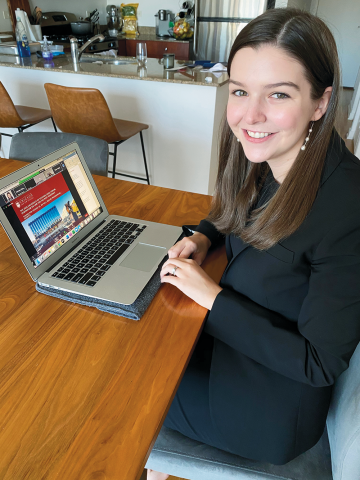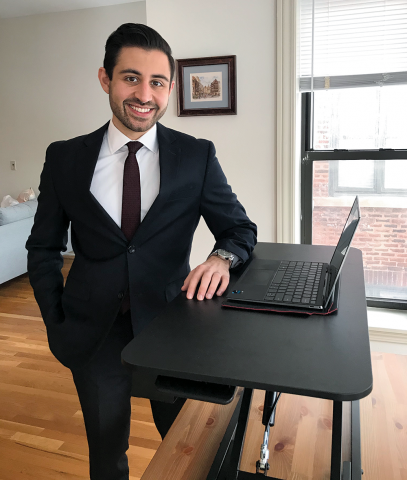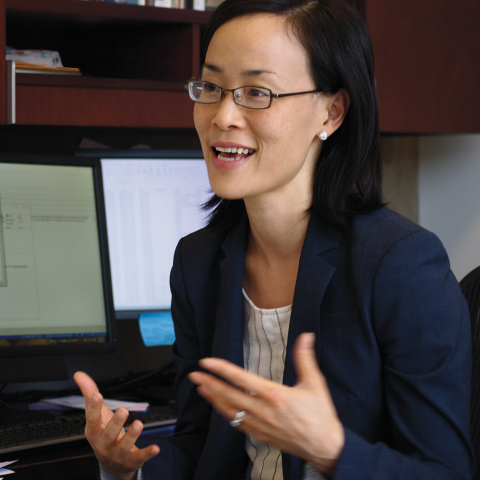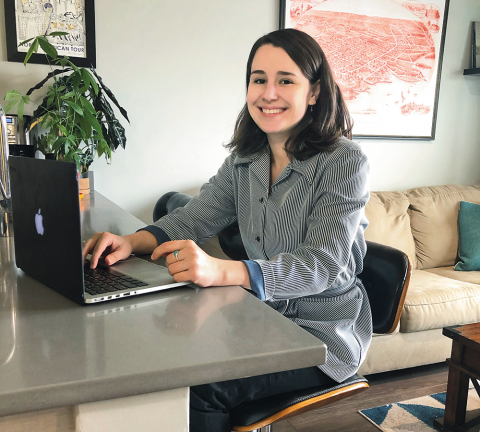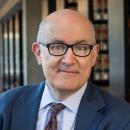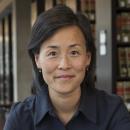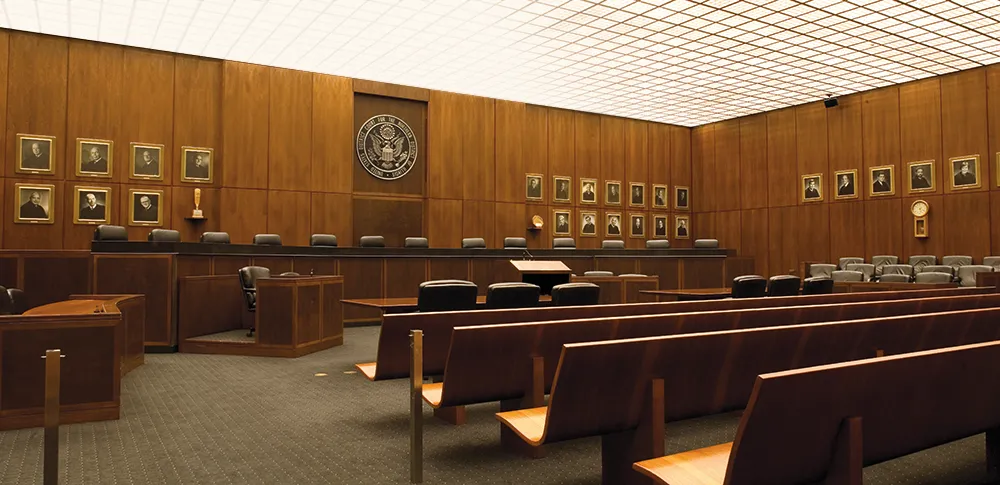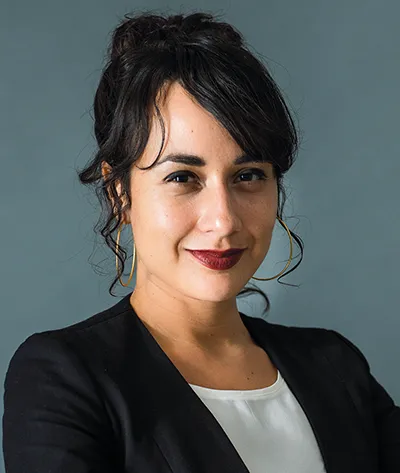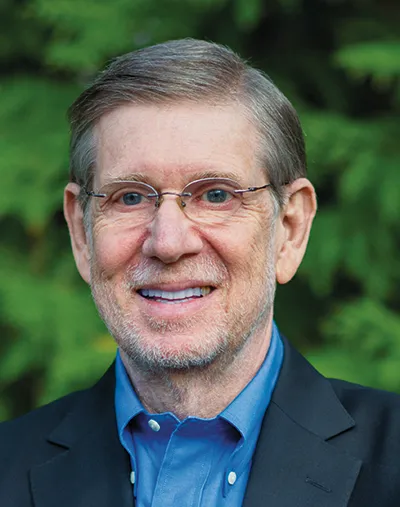Colloquia in the Time of COVID-19
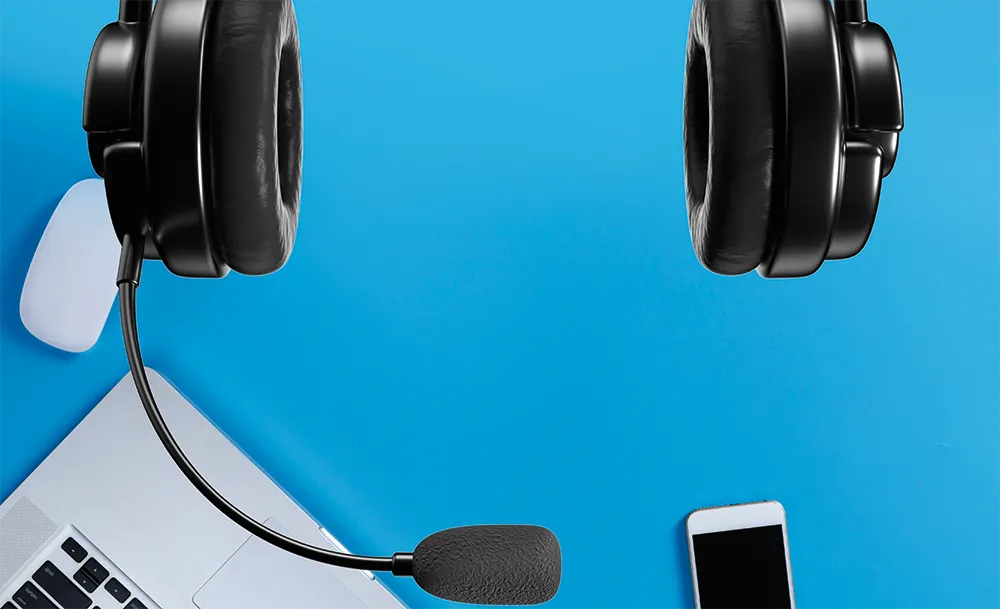
When Claire Lee, ’21, the 2020-2021 editor-in-chief of the University of Chicago Legal Forum, began planning the student-led journal’s annual symposium last spring, COVID-19 was still relatively new and the University only recently had transitioned to remote learning. The conference, “Law for the Next Pandemic,” was scheduled for November 2020—and like other conference organizers whose events were still months off, Lee and her editorial board still expected to host a face-to-face event featuring robust debates, a keynote address, and a dinner where students and participants could mingle.
There was little precedent for anything else. For 35 years, the Legal Forum has produced its annual volume by inviting top scholars to the Law School to present papers on a timely legal topic chosen by that year’s editorial board. Before 2020, speakers rarely presented remotely; in-person engagement was a key part of testing ideas and shaping the final articles.
But as the pandemic progressed, caution became the rule, and by summer, the Legal Forum’s editorial board had decided that Zoom would be the safest way to gather.
“There are upsides to doing things online only. ... [F]or the Dickerson conference, we were able to recruit people who would not otherwise be able to join.”
Professor Richard McAdams
“We knew if we waited and made the switch later in the game, it would be more difficult for everyone, especially our guests,” Lee said. “But it was still hard—that decision to go all online created new worries.”
To the surprise of many organizers, that second-choice format turned out to be far more than a mere consolation prize. There were trade-offs, of course, but the process that unfolded over the next seven months revealed new opportunities and unforeseen advantages. The organizers could reach a wider audience, recruit panelists who might otherwise have declined due to distance or time conflicts, and focus their efforts in new and often rewarding ways.
It was a discovery that played out across the Law School as professors, postgraduate fellows, and students not only continued to engage in scholarly work but found new and increasing opportunities to gather—a shift that may expand the reach and dynamics of academic colloquia even once in-person events return. By the end of this academic year, Law School faculty had organized numerous remote workshops, lecture series, and online conferences, including a “Colloquia on the Crisis in Policing,” a Q&A about the GameStop controversy, and a two-part virtual conference exploring the life and legacy of lawyer, activist, and business executive Earl B. Dickerson, the Law School’s first Black JD graduate. And buoyed by the success of these events and still facing COVID-19 restrictions, the other two student-led journals held their 2021 symposia online: the Chicago Journal of International Law in February and the University of Chicago Law Review in May.
“One thing we’ve learned is that there are upsides to doing things online only,” said Richard McAdams, the Bernard D. Meltzer Professor of Law, who helped organize both the Dickerson conference and the policing colloquia. “When we recruited speakers for the Dickerson conference, we were able to recruit people who would not otherwise be able to join. Virtual technology makes participating easier, and we reap benefits from that.”
For the Legal Forum students and their faculty symposium advisers, professors Daniel Hemel and Jennifer Nou, the decision to go remote offered a chance to shake things up—it didn’t make sense to follow the typical formula for an atypical event.
Instead of brainstorming the ideal list of contributors and then spending all summer extending invitations, they put out a call for papers, enabling them to reach a wider, more geographically diverse group of scholars. The organizers also revamped the traditional lunchtime keynote and engaged Chief Judge Rebecca Pallmeyer, ’79, of the US District Court for the Northern District of Illinois, in a more intimate question-and-answer session via Zoom.
And freed from the constraints of geography and the demands of planning guests’ travel and lodging, the world opened up. Attendees who weren’t in the building—or even in the country—were able to join, and the event was easily recorded and made available for asynchronous viewing. The students took on more active roles in reviewing proposals, moderating between the online panels, and shepherding questions behind the scenes.
This isn’t to say that they didn’t worry about pulling off their first-ever remote symposium.
They did, a lot.
Losing Sleep
Three things kept Lee up at night in the summer and fall, even though planning was going well.
“When we made the decision to switch to fully virtual, I was worried no one would come,” she said. “It’s very easy to recruit [attendees] when you’re at the Law School. You sit next to people in class every day and can talk to them to generate interest. You can hang posters. During lockdown, we didn’t have the same ways to recruit.”
“We were bringing together many moving pieces ... I was nervous something would go wrong.”
Legal Forum Editor-in-Chief Claire Lee
Lee worried that Zoom fatigue would also keep people away. But when the actual day came, her fears eased. Instead of diminished numbers, there was record attendance—enough to have overwhelmed Classroom V, where the symposium is typically held.
“In the past, in the first early morning session, we would usually fill half the room and would never have 85 or 90 people,” she said. “But because we were on Zoom, things became more flexible and the opening session was packed.”
Lee also worried about managing technology. Overseeing video discussions for four separate panels, making sure moderators had what they needed, and keeping up with questions coming over Zoom’s chat feature felt like a big undertaking. Adding to the stress was the fact that several panelists were in different time zones (it was very early morning in Australia and late afternoon in Israel, near the start of Shabbat).
“We were bringing together many moving pieces while relying on a technology to present for the first time,” Lee said. “I was nervous something would go wrong even though a large number of us are tech savvy and we’d had a lot of practice with Zoom because of our classes.”
Lee worried someone wouldn’t be able to hear or panelists wouldn’t be able to share their screens.
“At least when people gather in person, there’s a sense that once they’re in the room, things are good to go,” she said. “When you’re operating solely online, you don’t know what might happen from panel to panel.”
But with support from the Law School’s events team, who had been developing and refining their remote event expertise since the spring, the event unfolded smoothly.
“It turned out, we had very few tech issues,” Lee said.
There was one—at the very beginning, everyone was assigned the same name on the screen—but it was resolved quickly.
“The glitch was good in a way because we got a technical bug solved early, and we learned the sky did not fall,” Lee said.
A third looming worry stemmed from the virus itself.
“We thought, ‘What if one of our people contracts COVID and can’t participate?’” said Megan Delurey, ’21, the Legal Forum’s 2020 symposium editor. “How are we going to make sure that they’re okay, fill our spots, and adjust?”
Previous editorial boards had faced stressors, Delurey noted, but probably never on this scale.
“Sure, there’s sometimes an emergency or someone can’t travel normally, but you know about that before the actual day,” Delurey said. “We were nervous up until the very end.”
Ultimately, the good outweighed the bad.
“Claire and I were able to take more active roles on the day of the conference, in part because we needed to manage the technology,” Delurey said. “And our executive articles editor, Dan Simon, [’21], spent a lot of time reviewing the proposals sent in by potential panelists. It turned out that the whole experience was really rewarding for all of us.”
Widening the Circle
As the Legal Forum was working through its own plans, the Law School’s faculty were also taking advantage of the remote format to organize colloquia that had been previously planned as in-person events as well as to add new ones.
In addition to the spring “Colloquia on the Crisis in Policing,” the Law School sponsored a seven-week summer discussion series on police reform featuring 14 members of the Law School’s faculty. Throughout the year, the number of remote offerings continued to increase; offerings included a series of lectures hosted by the Coase-Sandor Institute for Law and Economics, virtual events related to the 2020 election, and the two-part Dickerson Conference, held in October 2020 and April 2021.
Nou, a scholar of administrative law, said she received invitations to ad hoc workshop series that would never have existed had it not been for Zoom. The online platform made participation easier than meeting in the same room.
There were advantages for students as well.
“More students can get involved [in online events] because it’s easier to slot in a panel or two if they don’t have to come back into the Law School,” she said.
It’s also easier for colloquia organizers to pull together both experts and an audience, especially during the summer when fewer students and faculty are in the building. McAdams noticed this with the summer discussion series on policing. It was fairly easy, he said, to set up the lunchtime series in Zoom, tap into the expertise of the Law School’s faculty, and broadly share the link with alumni, students who were working summer jobs, and other members of the community.
The format also offered an opportunity for another student journal, the Chicago Journal of International Law (CJIL), to expand its relatively young symposium. In the winter of 2018, CJIL launched its own annual conference to develop scholarship. For the first two years, CJIL staff members who were interested in academia and the mechanics of workshopping presented their own student papers and received feedback from Law School professors and other students. The annual event concluded with a lecture by an international law expert.
Remote learning helped push forward a new iteration of this symposium. CJIL’s Editor-in-Chief Neema Hakim, ’21; Managing Editor Tyler Downing, ’21; and Executive Articles Editor Jared Mayer, ’21, worked with professors Tom Ginsburg and Adam Chilton to invite a slate of scholars from around the world to discuss the transformation of international law scholarship, a move they hope will enable the journal to expand its visibility as a leading forum on global legal issues.
The resulting symposium, held in February, featured a panel of scholars responding to an essay—written by Chilton, Ginsburg, and Professor Daniel Abebe, the Harold J. and Marion F. Green Professor of Law and the University’s vice provost—about the social science approach to international law. Because the cost of presenting online was substantially less than hosting an in-person conference, the students were able to easily experiment and organize a more formal symposium. In the spring, the CJIL staff prepared the essays presented at the event for publication in the summer issue, Volume 22.1.
“The 2021 symposium was a major step forward for CJIL. We not only adapted to the circumstances of COVID-19, but we also leveraged the resulting popularity of video-conferencing platforms like Zoom to facilitate a truly global conversation,” Hakim said. “We hope the symposium contributes to the rise of some version of a Chicago School of International Law, one which emphasizes normative restraint, empiricism, and skepticism.”
In May, the Law Review held its virtual symposium—“This Violent City? Rhetoric, Realities, and the Perils and Promise of Reform,”which examined the causes of urban violence—and, like CJIL, organizers benefited from all the technological and logistical experience gathered earlier in the pandemic.
Students who plan virtual events now are able to use tested protocols developed by the Law School’s events team to manage setup, including deciding whether an online symposium should be a webinar or a meeting, obtaining permissions to record, training moderators to handle audience questions, and sorting through details such as what viewers will see onscreen during breaks. They can also decide whether to require registration, allow chat, and make an event public.
“Zoom’s flexibility really worked out to our benefit for a variety of reasons,” Downing said. “By inviting such a large group of thinkers to react to our own scholars, we have built a springboard of ideas that will help reshape what CJIL has to offer the world.”
The Enduring Value of Face-to-Face Engagement
Despite all of this progress and all of the advantages, it is unlikely that in-person events will disappear.
Zoom’s flexibility really worked out to our benefit ... By inviting such a large group of thinkers to react to our own scholars, we built a springboard of ideas that will help reshape what [our journal] has to offer the world.”
CJIL Managing Editor Tyler Downing
There are, after all, disadvantages to virtual-only events, both McAdams and Nou said. For one, participants and students miss out on the interactions that tend to happen outside the formal structure of a conference or class—the scholarship ideas that are born during hallway conversations or the difficult questions a student or conference attendee might ask when alone in a room with a professor or colleague.
“You normally bring people together and have a meal as part of the conference,” McAdams said. “And you have time to chat when the conference presentations are not going on. Online, such opportunities are lost.”
Nou agreed. During the pandemic, she took part in two daylong plenary sessions for the Administrative Conference of the United States.
“One of the great pleasures of that annual event is seeing everybody from my field,” she said. “Not being able to see colleagues has a huge cost. You don’t get to hear about other people’s projects and can’t just catch up.”
Both believe there is value in getting to know the panelists. Informal discussions that happen around the edges of presentations should not be underestimated, McAdams said.
When the pandemic is over, he thinks conference formats may vary from event to event, and decision-making is likely to evolve. Conference organizers will weigh the pros and cons and prioritize the preferred format based on things like the event’s mission, budget, and panelists’ schedules. Some symposia might be entirely online, others might be in person, and some may feature both.
For instance, the Dickerson Conference, originally planned as an in-person conference in April 2020, was divided into two separate events when organizers were forced to reschedule. Their hope was to hold part of it online and save part for the return of in-person events.
The first part took place via Zoom on October 30, 2020, and featured 10 academics, lawyers, and historians who contextualized Dickerson’s work. The organizers were hoping to hold the second part in person in fall 2021, but ultimately decided to hold it online this spring after it became clear that waiting until fall wouldn’t guarantee that they could hold an in-person event. The second part featured discussions involving activists, journalists, and those who knew Dickerson personally.
“The Dickerson Conference was exactly the kind of symposium where we wanted to get people together in person because we were celebrating someone who had not been sufficiently celebrated,” he said. “We wanted to have spontaneous conversations where participants might discover that they’re interested in the same things.”
Nou agrees that there are trade-offs to consider when deciding on the format for a conference or lecture. She says the way professors and students interact online is different than when they meet face to face. Students can refer to recordings after a lecture, which is helpful, and they might be able to drop into more talks without traveling to the Law School. She misses in-person interaction.
“Sometimes you have students who may confess to being confused by the material or who are nervous about a future job opportunity related to the class,” she said. “Being in a room together, you have a little bit more of an atmosphere of confidentiality that can get lost in Zoom.”
Nou notes that participation might be hindered during online events because everything is recorded.
“There is a chance that students will worry that something they say could be slightly misperceived as controversial, and this might chill some of the usual give and take,” she said.
McAdams thinks some conferences might be spread out over several days so that more focused attention can be paid to a particular idea. Now that the classrooms are enabled for Zoom, panelists who are abroad could be invited more often to participate. Students could also hop online and attend conferences if they are sick or out of town.
Lee thinks that it is likely the Legal Forum will go back to in-person symposia, at least part of the time, but that those format decisions will depend on that year’s subject matter, budgets, and goals. She thinks a hybrid model would work well because it allows for a greater diversity of ideas as more people are able to participate.
She sees value in this year’s challenges—they forced her and the board to compensate and seek out new ways of doing things.
“It turned out gathering a group of scholars and students online paid new kinds of dividends,” Lee said. “It made us rethink how to present and troubleshoot, but there was also some joy in doing the symposium online because there was no way we could have brought some of these people together if we had been in person.”
